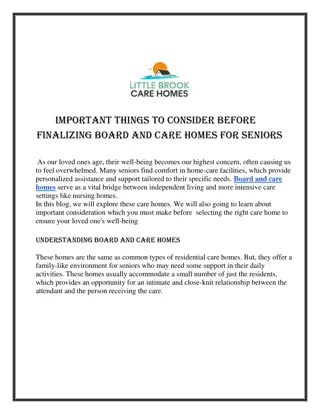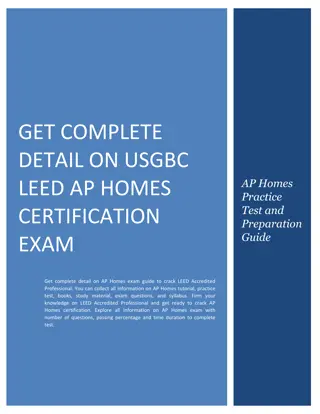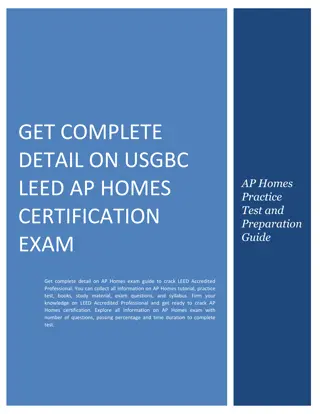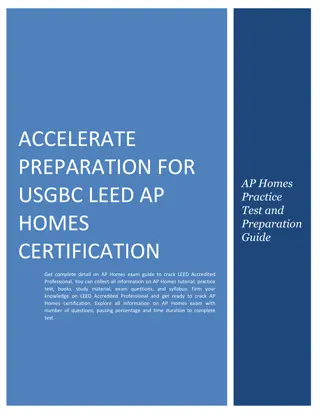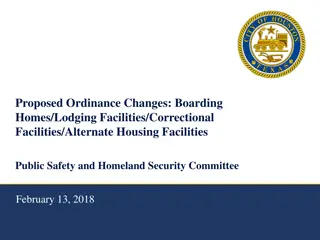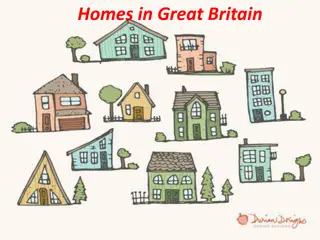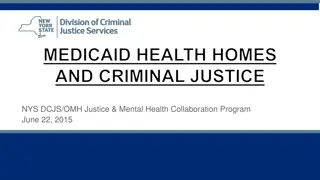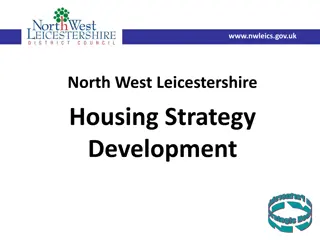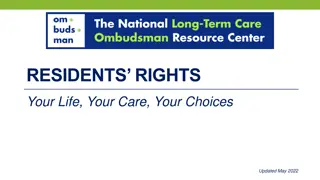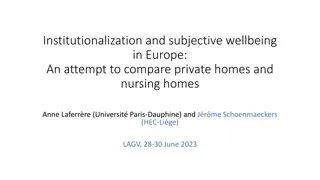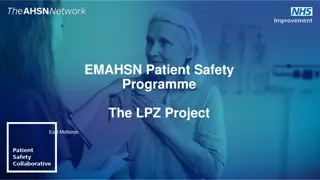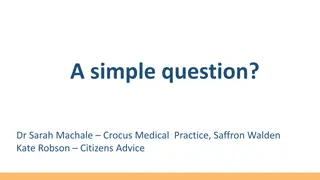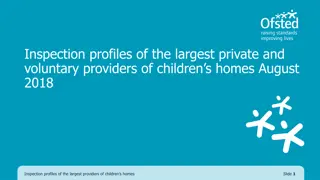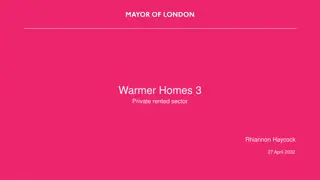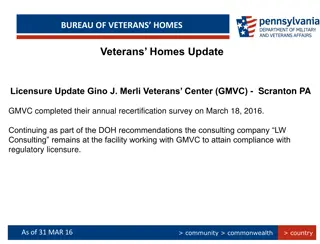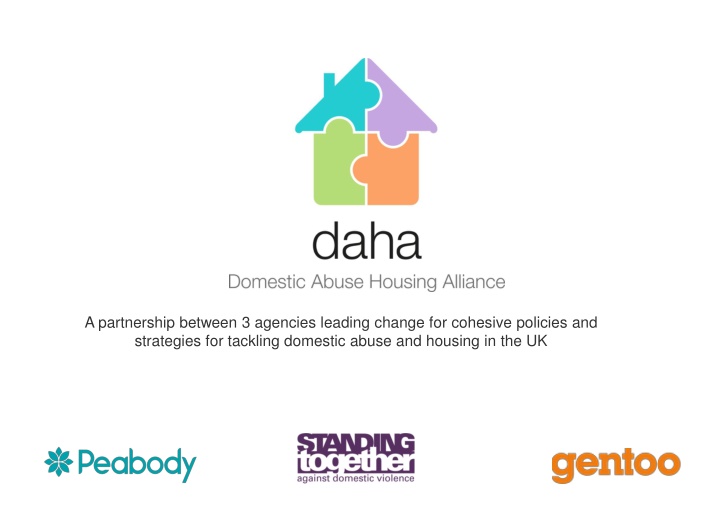
Collaborative Efforts to Address Domestic Abuse and Housing Issues in the UK
A partnership among three agencies in the UK is leading the charge for cohesive policies and strategies to combat domestic abuse and address housing needs, highlighting the challenges faced by women, children, and survivors. Attitudes towards domestic abuse and the importance of a Coordinated Community Response are also discussed, emphasizing the crucial role of housing providers in supporting victims of domestic violence. The mission of DAHA is to improve the housing sector's response to domestic abuse by fostering a coordinated community approach and promoting collaboration between housing, homelessness, and domestic abuse sectors.
Download Presentation

Please find below an Image/Link to download the presentation.
The content on the website is provided AS IS for your information and personal use only. It may not be sold, licensed, or shared on other websites without obtaining consent from the author. If you encounter any issues during the download, it is possible that the publisher has removed the file from their server.
You are allowed to download the files provided on this website for personal or commercial use, subject to the condition that they are used lawfully. All files are the property of their respective owners.
The content on the website is provided AS IS for your information and personal use only. It may not be sold, licensed, or shared on other websites without obtaining consent from the author.
E N D
Presentation Transcript
A partnership between 3 agencies leading change for cohesive policies and strategies for tackling domestic abuse and housing in the UK Standing together against domestic violence
Domestic abuse and housing needs Onus on women and children to leave their home, giving up their tenancies and start over. Emphasis on refuge accommodation as the main housing option for women and children (Approx. 270 specialist domestic abuse refuges in England. 60% of referrals were turned away in 2016/17, Women Aid England, 2018) Risk of homelessness - 35% of rough sleepers made homeless because of DVA and 50% had experienced DVA (St Mungo s 2014) 76% of domestic homicides take place inside the home (Nia and Women s Aid England Femicide Census, 2018)
Attitudes towards Domestic Abuse Tenant recorded what he thought was noise nuisance and was actually the murder of his next door neighbour Natasha Bradbury. Timothy Down says he thought it felt 'better to stay away' https://www.independent.co.uk/news/uk/home-news/neighbour-record- sounds-woman-being-beaten-death-instead-calling-police-timothy-down- natasha-a7222406.html
TheCoordinated Community Response No single agency or professional has a complete picture of the life of a domestic abuse survivor but many will have insights that are crucial to their safety.
Mobilising housing providers 85% of victims sought help five times on average to get support from professionals in the year before they got effective help (Safe Lives, 2016) Friends, family and neighbours often the first to know about domestic abuse (Finding the Cost of Freedom, 2014) Kelly, Sharp and Klein (2014) found that housing providers were in practice often reluctant to remove perpetrators. Social housing providers (housing associations, local government housing) have safeguarding duties
DAHAs Mission DAHA s mission is to improve the housing sector s response to domestic abuse by promoting a coordinated community response to domestic abuse and: Support organisations to enhance their own organisations response Promote joined up working between housing, homelessness and domestic abuse sectors
Who we are and what we do? Development and dissemination of accreditationprocess for social housing providers in order to improve national response to domestic abuse - standards cover 8 priority areas Funding from London Councils, Comic Relief, Home Office, MHCLG & Tampon Tax Online self assessment toolkit (HO), national DAHA workshops (CR/LC) DAHA Development Managers (Cambridgeshire, National, London) Evaluation York University (CR/LC) Housing First Tri-Borough (MHCLG) Private rented sector post (TT and MHCLG) Whole Housing (MHCLG)
DAHA Accreditation Standards Priority Areas 1. Policy & Procedure 2. Case Management 3. Risk Management 4. Equality & Diversity 5. Perpetrator Management 6. Partnership working 7. Training 8. Publicity & Awareness Free online toolkit with template docs and guidance on above available at https://www.dahalliance.org.uk/accreditation
Social Housing Types of housing tenure in England (DCLG, 2014): 17% social housing (local government & housing associations) 63% owner occupied 20% private rented What are we doing with the remaining 83% of households?
National Housing and Domestic Abuse Policy and Practice Group
An Introduction to the Whole Housing Approach
National Housing and DA Policy Group National Housing and DA Policy Group May 2018 DAHA develop outline of the Whole Housing Approach (WHA) and presents it to the DA National Housing and DA Policy and Practice group as part of DA Bill consultation. The group endorses Whole Housing and response is sent which is then used as written evidence by Home Affairs Select Committee Nov 2018 WHA included as response to Social Housing Green Paper Nov 2018 MHCLG funding secured to pilot WHA in 3 areas - Cambridgeshire and Peterborough, Stockton and West London Tri-Borough Jan 2019 WHA recognised in DA Bill Aug 2019 WHA included in response to MHCLG Support for victims of domestic abuse in safe accommodation
Whole Housing Approach Mission To improve housing options for families across all housing tenure types Vision To develop and model Whole Housing approaches and to evaluate their impact in terms of: reducing homelessness early intervention increasing tenancy sustainment providing move on options for families affected by domestic abuse.
Whole Housing Approach Green part of Whole Housing project Blue not included Orange separate project 1. Refuges Social Housing (DAHA) 2. Private Rented Sector 11. LAs/ housing options 3. Privately owned Whole housing for DVA 10. Resident support schemes 4. Managed Reciprocals 9. Supported/ sheltered housing 5. Sanctuary Schemes 8. Perpetrator Management 6. Housing First 7. Outreach/ floating support/ IDVAs
Whole Housing Pilot Sites Stockton Cambridgeshire London (three boroughs) Project timeframes: October 2018 to March 2020
@DAHAlliance @GudrunBurnet daha_team@standingtogether.org.uk www.dahalliance.org.uk #DAHousing #MakeAStand


